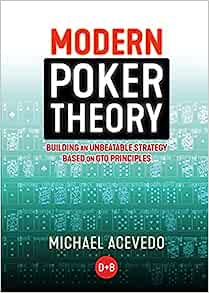Modern Poker Theory: Building an Unbeatable Strategy Based on GTO Principles

“Modern Poker Theory” is a groundbreaking book that dives deep into the world of Game Theory Optimal (GTO) strategy and its application in modern poker. Written by a renowned poker theorist, the book offers an in-depth exploration of advanced concepts and provides readers with a comprehensive framework to develop an unbeatable poker strategy.
One of the book’s greatest strengths is its ability to demystify the complex subject of GTO strategy. The author breaks down intricate concepts into manageable parts, allowing readers to gradually grasp the underlying principles. By explaining the mathematical foundations and providing real-world examples, the book makes GTO theory accessible to a wide range of players, from intermediate to advanced skill levels.
“Modern Poker Theory” focuses on constructing a balanced and fundamentally sound strategy. It provides a detailed examination of pre-flop and post-flop play, addressing various scenarios encountered in poker games. The book covers topics such as range construction, bet sizing, and exploiting imbalances in opponents’ strategies. The strategic insights provided are invaluable, as they offer players a competitive edge in both live and online poker environments.


Another notable aspect of the book is its emphasis on game dynamics and player adjustments. It highlights the importance of adapting to changing circumstances, including table dynamics, player tendencies, and stack sizes. By understanding these nuances, readers can optimize their decision-making process and exploit opponents’ weaknesses effectively.
“Modern Poker Theory” features numerous hand examples and analyses, which greatly enhance the learning experience. The practical applications of GTO principles allow readers to observe how theory translates into practice. This hands-on approach helps solidify understanding and provides players with the tools to make informed decisions in real-time.
While the book excels in its exploration of GTO strategy, it is worth noting that GTO play is not the end-all-be-all solution to poker success. The book acknowledges this by mentioning the limitations of strict adherence to GTO in certain situations. Nonetheless, the principles and concepts outlined in the book serve as a strong foundation for players to build upon and adapt to exploit their opponents effectively.
In conclusion, “Modern Poker Theory” is a remarkable resource for players seeking to deepen their understanding of advanced poker strategy based on GTO principles. Its clear explanations, practical examples, and focus on game dynamics make it an indispensable guide for serious poker enthusiasts. While the book’s content may be challenging for beginners, intermediate and advanced players will find immense value in its insights. If you’re willing to invest the time and effort required to master GTO strategy, this book will undoubtedly take your poker game to the next level.
Rating: ★★★★☆ (4/5)


